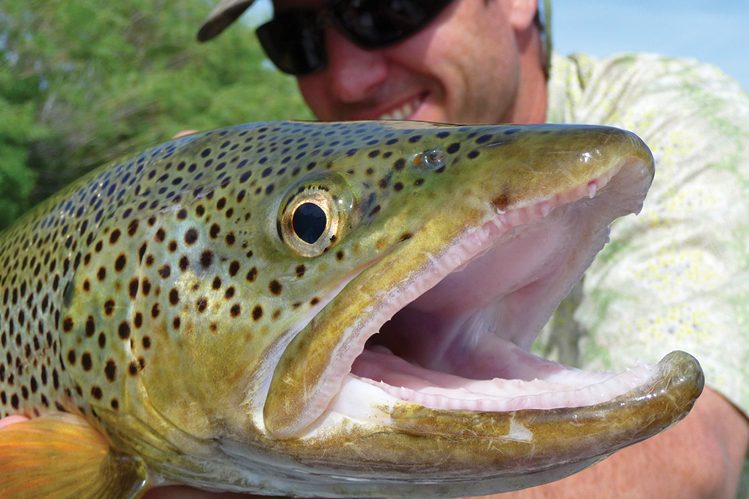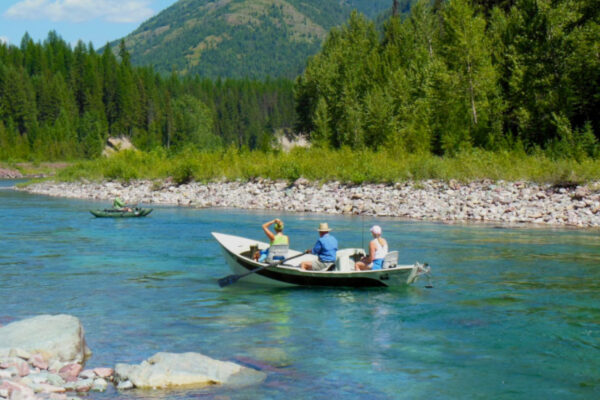Imagine standing by a crystal-clear river, the sun warming your face, as you cast your line into the wild waters of Glacier National Park, Montana. If you love fly fishing or have always wanted to try, this place offers some of the best spots to catch trout while surrounded by breathtaking mountain views.
You’ll discover everything you need to know to make your fly fishing trip unforgettable. From the best fishing spots to expert tips, get ready to unlock the secrets of Glacier National Park and reel in your next big catch. Keep reading—your ultimate fly fishing adventure starts here.

Credit: wildmontanaanglers.com
Best Fishing Spots
Glacier National Park in Montana offers some of the best fly fishing spots in the country. The park’s clean waters and natural beauty make it a top choice for anglers. Different places in the park provide unique fishing experiences. Here are the best spots to cast your line.
Rivers And Streams
Glacier’s rivers and streams are full of trout. The Flathead River is popular for its strong current and plenty of fish. The Middle Fork and North Fork also offer great trout fishing. These waters are home to cutthroat, rainbow, and bull trout. Fishing here requires some skill but rewards with exciting catches.
Lakes And Ponds
Many lakes and ponds in Glacier Park hold large trout and other fish. Lake McDonald is a favorite spot for anglers. Its calm waters make fishing relaxing. Other lakes like St. Mary and Two Medicine also provide good fishing. These spots work well for beginners and families.
Hidden Gems
Some lesser-known places offer peaceful fishing away from crowds. Avalanche Lake and Bowman Lake are quiet spots with healthy fish populations. Small ponds near trailheads can surprise with good catches. These hidden gems give a chance to enjoy nature and fish in peace.

Credit: greatnorthernresort.com
Top Fish Species
Glacier National Park offers a rich variety of fish for anglers to catch. The park’s cold, clear waters are perfect habitats for many species. Knowing the top fish species helps you plan your fishing trip well.
Trout Varieties
Trout are the stars of fly fishing in Glacier National Park. Rainbow trout are common and fight hard on the line. Cutthroat trout show beautiful colors and are native to this region. Bull trout are larger and prized by many anglers. Brook trout add more variety with their bright spots and aggressive bites. Each trout species provides a unique challenge and experience.
Other Game Fish
Besides trout, other game fish live in the park’s waters. Mountain whitefish swim in deep, cold rivers and streams. They are often overlooked but provide good sport. Arctic grayling, known for their sail-like fins, are found in some park lakes. These fish add more excitement and options for fly fishers exploring Glacier National Park.
Gear Essentials
Fly fishing in Glacier National Park, Montana needs the right gear. Proper equipment helps you enjoy the experience and catch more fish. Pack light but smart. Focus on quality and usefulness.
Choosing the correct gear makes your trip easier and more fun. Each item plays a role. Understanding what to bring helps you prepare well.
Rods And Reels
Select a rod that matches the water and fish size. A 9-foot, 5-weight rod is a good choice for most park streams. It balances power and control. Reels should be durable and smooth. A reliable drag system helps fight strong fish. Keep the reel light to avoid fatigue.
Fly Selection
Choose flies that match local insects. Dry flies, nymphs, and streamers all work in the park. Popular patterns include Elk Hair Caddis and Woolly Bugger. Carry a mix to adapt to different conditions. Change flies often to find what fish prefer that day.
Tackle And Accessories
Bring a sturdy fly line and extra leaders. Leaders should be tapered and about 9 feet long. A good landing net helps handle fish safely. Use polarized sunglasses to see underwater better. Don’t forget forceps, clippers, and a floatant for dry flies. A small first aid kit is smart too.

Credit: glacierguides.com
Seasonal Tips
Fly fishing in Glacier National Park changes with the seasons. Each season offers unique challenges and rewards. Knowing what to expect can improve your catch and your experience.
Seasonal tips help you prepare for different weather, water levels, and fish behavior. These tips guide your choice of flies, gear, and techniques.
Spring Strategies
Spring brings rising water from melting snow. Fish stay deep and slow in colder water. Use smaller, natural-colored flies like nymphs and midges. Focus on slow, steady retrieves. Look for calmer water near the banks. Early mornings and late afternoons are best.
Summer Techniques
Summer means warmer water and active fish. Dry flies and hoppers work well in bright light. Cast near rocks and logs where fish hide. Use lighter tippets for less splash. Fish feed near the surface during cool parts of the day. Evening fishing can be very productive.
Fall Approaches
Fall brings cooler water and fish preparing for winter. Fish move to deeper pools and slower currents. Use larger nymphs and streamers in darker colors. Cast upstream and let your fly drift naturally. Watch for rising fish in the afternoon. This season offers steady bites and less crowd.
Techniques And Tactics
Fly fishing in Glacier National Park requires careful techniques and smart tactics. This helps anglers catch more fish and enjoy the experience. Understanding different methods improves your chances on these beautiful waters.
Focus on how you cast, read the water, and present your fly. Each step plays a key role in successful fishing here.
Casting Methods
Use smooth and controlled casts to avoid spooking fish. A basic overhead cast works well in most places. Roll casting helps in tight spots with limited space. Practice short and accurate casts near banks and pools. Change your casting angle to reach different spots.
Reading Water
Look for areas where fish like to hide. These include deep pools, undercut banks, and behind rocks. Watch for ripples or bubbles on the surface. These signs often show where fish feed. Focus on slow or calm water edges. Fish often wait there for food to come by.
Presentation Tips
Keep your fly moving naturally on the water. Avoid dragging it too fast or too slow. Let your fly drift with the current for a real look. Use light tippets to prevent fish from seeing the line. Change flies if the fish don’t bite after some time.
Regulations And Permits
Fly fishing in Glacier National Park requires attention to rules. These rules protect fish and keep the park’s waters healthy. Knowing about permits and regulations helps you enjoy fishing responsibly. It also helps preserve the park for future visitors.
Fishing Licenses
All anglers must have a valid Montana fishing license. Licenses are available online or at local stores. Daily, weekly, and annual options exist. Make sure to carry your license while fishing. Park rangers may check for licenses at any time.
Catch Limits
Catch limits protect fish populations in the park. Limits vary by species and fishing area. Usually, only a few fish can be kept each day. Many fish must be released carefully to survive. Follow all catch and size rules to avoid fines.
Protected Areas
Some waters in Glacier National Park are off-limits. These protected areas help conserve fish habitats. Watch for signs marking restricted zones. Fishing in these areas is not allowed at any time. Respect these boundaries to help maintain the park’s natural balance.
Safety And Preparation
Fly fishing in Glacier National Park, Montana, offers stunning views and great fishing. Safety and preparation are key for a good experience. The park’s wilderness can be unpredictable. Knowing what to expect helps you stay safe and enjoy your trip.
Weather Considerations
Weather changes fast in Glacier National Park. Mornings may be warm, but afternoons can turn cold or rainy. Carry waterproof gear to stay dry. Dress in layers for comfort. Check the weather forecast before you start fishing. Watch for signs of storms or strong winds. Plan your day to avoid harsh weather conditions.
Wildlife Awareness
Glacier National Park is home to bears, mountain lions, and other animals. Always stay alert and make noise while walking. Keep food sealed and away from your sleeping area. Carry bear spray and know how to use it. Never approach or feed wildlife. Respect animal space to avoid danger. Stay calm if you meet a wild animal.
Packing Checklist
Bring essential items for a safe fishing trip. Include a fishing license and rod. Pack sunscreen and insect repellent. Carry plenty of water and snacks. Use a first aid kit for minor injuries. A map and compass help with navigation. Don’t forget a flashlight and extra batteries. Proper packing makes your trip safer and more fun.
Local Resources
Glacier National Park offers some of the best fly fishing in Montana. Local resources can make your trip easier and more fun. These resources include guides, fly shops, and fishing reports. They help you find good spots and get the right gear.
Understanding what each local resource offers helps you prepare well. It also improves your chances of catching fish.
Guides And Outfitters
Experienced guides know the best rivers and lakes. They teach fishing techniques suited for Glacier’s waters. Outfitters provide gear rentals and fishing licenses. Hiring a guide saves time and boosts success. They also share safety tips and local rules.
Fly Shops
Fly shops stock flies, rods, reels, and other gear. Staff give advice on the best flies for the season. Some shops offer repair services for your equipment. These shops are great for last-minute needs. They often have maps and local fishing tips.
Fishing Reports
Fishing reports update daily or weekly. They tell which spots have more fish. Reports include water conditions and weather changes. Checking reports helps plan your fishing trips. They keep you informed about hatch activity too.
Frequently Asked Questions
What Are The Best Fly Fishing Spots In Glacier National Park?
The best spots include McDonald Creek, Avalanche Creek, and the Middle Fork of the Flathead River. These areas have abundant trout and scenic views, ideal for fly fishing enthusiasts of all skill levels.
When Is The Prime Season For Fly Fishing In Glacier Park?
The prime season runs from late June to early September. During this time, water levels are ideal, and insect hatches attract more fish, making your fly fishing experience highly rewarding.
What Fish Species Can I Catch In Glacier National Park?
You can catch native species like cutthroat trout, bull trout, and grayling. Non-native rainbow and brown trout are also common, providing diverse fishing opportunities throughout the park.
Do I Need A Fishing License For Glacier National Park?
Yes, a valid Montana fishing license is required. Additionally, specific park regulations apply, so check local rules before fishing to ensure compliance and protect the environment.
Conclusion
Fly fishing in Glacier National Park offers a peaceful and fun experience. The clear waters and beautiful views make every cast special. Anglers can enjoy catching trout while surrounded by nature. Remember to follow park rules and respect the environment.
Plan your trip well to enjoy the best spots and seasons. This adventure will leave lasting memories and a deep love for Montana’s wilderness. Give it a try and feel the calm of Glacier’s streams.

Tony is a professional fishing instructor, and his hobby is fishing! He has been fishing for the last four years, and he loves the fishing instructor profession. Based on his experiences with different types of fishing, he shares his opinion about various fishing techniques so that a beginner can get started right away. Find him on Twitter. Happy reading!

